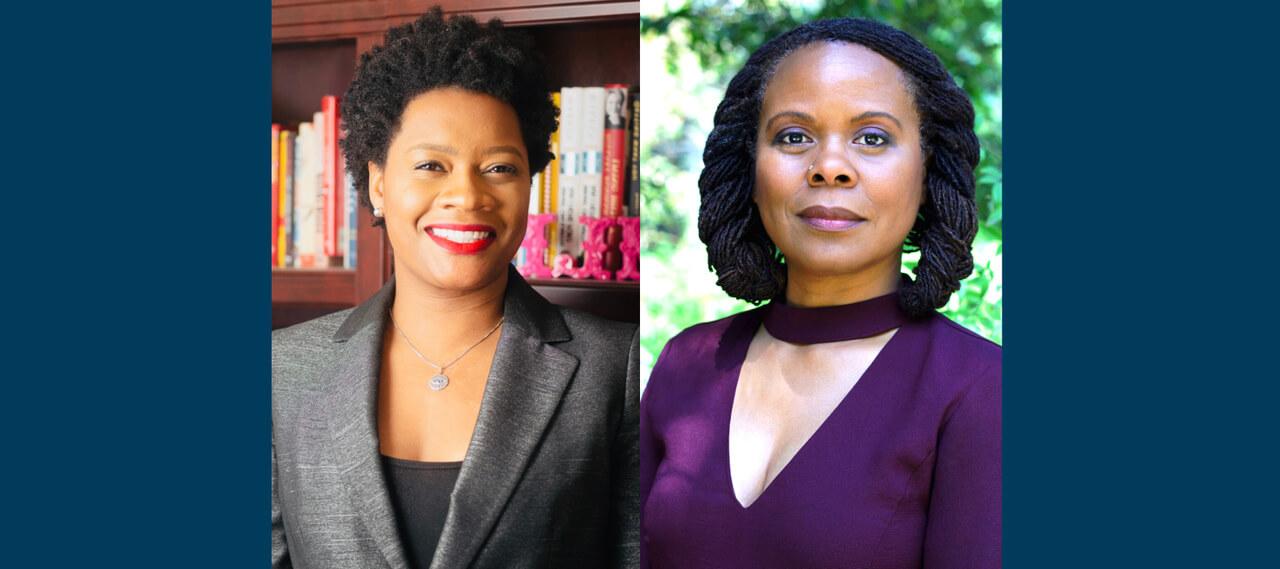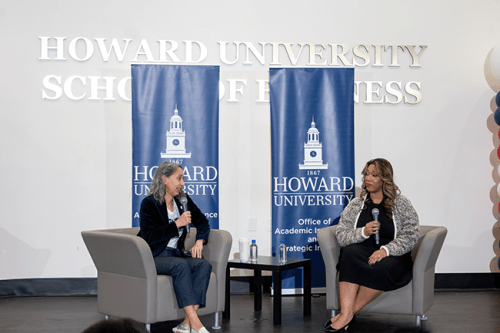
WASHINGTON A team of researchers co-led by Howard University’s Monica Ponder, Ph.D, MS, MSPH (pictured left) and UCLA’s Chandra Ford, Ph.D., MPH, MLIS (pictured right) received a $1.7 million grant from the CDC Foundation designed to reach historically marginalized and disadvantaged populations during public health crises.
The endeavor, dubbed Project REFOCUS, which leverages more than a decade of their experience applying epidemiology and health communication to racism as a public health problem, tracks the intersecting pandemics of racism, especially as expressed through stigma, and COVID-19, with a focus on providing information to the communities most directly impacted. Key concerns include stereotypes about the origins of coronavirus disease (COVID-19) and the historical and present-day ways structural racism influences the social determinants of health and health access among diverse communities.
“During crises, fear can have a counter effect on access and adherence to community-level mitigation efforts,” said Ponder, an epidemiologist and assistant professor of health communication in the Department of Communication, Culture and Media Studies at Howard University’s Cathy Hughes School of Communications. “Chronic stress is an important pathway by which stigma influences physical and mental health. That can become a vicious cycle, fueled by racism and bias. Public health crisis communications must also recognize the historical trauma, lived experiences, and political climate in which people reside … to ignore this context is malpractice.”
In addition, prejudice stemming from rumors and scare-mongering can lead to unfair treatment and stress, which itself has a negative impact on physical and mental health.
“We have to shift the focus beyond merely documenting higher rates of death, disease and underlying conditions in our communities toward eradicating the inequities. As with any other threat to health, we can only do that by identifying the root causes - meaning, the causes of the causes of the unequal social conditions” said Ford, founding director of the UCLA Fielding School of Public Health’s Center for the Study of Racism, Social Justice & Health and professor in the Department of Community Health Sciences. “Further, as with prior pandemics, COVID-19 stigma is highly racialized, making Asian populations in particular susceptible to hate crimes.”
Project REFOCUS’ initial funding is from the CDC Foundation, an independent nonprofit created by Congress to mobilize philanthropic and private-sector resources to support the Centers for Disease Control and Prevention’s and public health community’s critical health protection work.
“As a nation, we’re only as strong and healthy as those who are most disproportionately affected by the pandemic,” said Dr.Lauren Smith, chief equity and strategy officer for the CDC Foundation. “The CDC Foundation is pleased to provide initial support to Project REFOCUS, which is aimed at understanding the views, challenges and needs of our communities experiencing the most harmful impacts of the pandemic and then leveraging and empowering community-based efforts and organizations to engage with and strengthen these communities.”
These very real issues have a huge impact on the ability of public health officials to slow the spread of a pandemic, much less treat the sick, Ford said. As examples, she said, the pandemic has disproportionately struck the nation’s Latino populations, as it has in African American, Native American and Pacific Islander communities; the death rates in those communities from COVID-19, is at least double that for Whites and Asian Americans, federal data shows.
“Public health practitioners face challenges in effectively monitoring the presence, spread and impacts of COVID-19 among these disadvantaged populations,” Ford said. “Lessons learned from prior epidemics, such as HIV/AIDS, make it clear that stigma and mistrust slow disease mitigation efforts among the most disadvantaged populations, contribute to mistrust of public health messages, delay access to services, and reduce adherence to treatment. This mistrust is rooted not in science denialism, but in legitimate concerns about the unequal treatment African American and other communities have received in healthcare.”
The project – officially, Racial Ethnic Framing of Community-Informed and Unifying Surveillance, or REFOCUS – will study COVID-19-related stigma and discrimination in communities of concern, and provide real-time information for public health officials, members of the public, and policymakers to help them reach populations at increased risk by building trust between essential and frontline workers and the communities they serve.
“Health communication practitioners rely on data to understand the people at the highest risk for disease and illness,” said Ponder. “The problem is that, without cultural specificity that takes into account racism as expressed through stigma and discriminatory structural factors, even targeted public health communication may default to single, rarely multifaceted, approaches that that often miss many people in a given population. These limitations are rapidly magnified during public health crises.”
The project is designed to:
- Explore the establishment or expansion of data collection systems and social listening protocols that effectively monitor, in real time, the impacts of social stigma and racism on the population as they affect COVID-19 mitigation and prevention practices;
- Develop model communication materials and recommendations for responding in real time to findings from stigma monitoring systems and signals from specific communities;
- Leverage and empower community-based efforts and organizations by providing tools, technical assistance and education to trusted essential and frontline workers (e.g. community health workers, pharmacists, social workers) who work, live in and represent the communities disproportionately affected by COVID-19; and
- Engage media outlets and journalists to collaborate and share best practices for delivering messages to communities of concern, while offering the views of the community to be considered and honored in community-based work.
“All successful communications efforts require knowing the audience; that’s why the advertising industry spends huge amounts of time and money on focus groups and testing ad campaigns,” said Ford. “What we’re working on is learning how to most effectively talk with these disproportionately impacted populations; otherwise, they will continue to be at risk, and as has been said, an infection anywhere means the risk of infection everywhere.”
The project is led by Howard University’s Department of Communication, Culture and Media Studies and the Fielding School’s UCLA Center for the Study of Racism, Social Justice & Health. Ford, who currently serves as director of the center, was lead editor of Racism: Science & Tools for the Public Health Professional, published in 2019 by the American Public Health Association and the first comprehensive work to understand and address the public health implications of racism.
Work on Project REFOCUS is underway, and the research teams have developed crisis communication tools and strategies for local communities and media, as well as a prototype tool for a stigma-focused community listening and surveillance for monitoring indicators of racism and stigma. For more information, please visit projectrefocus.com.
# # #
The UCLA Fielding School of Public Health, founded in 1961, is dedicated to enhancing the public's health by conducting innovative research, training future leaders and health professionals from diverse backgrounds, translating research into policy and practice, and serving our local communities and the communities of the nation and the world. The school has 631 students from 26 nations engaged in carrying out the vision of building healthy futures in greater Los Angeles, California, the nation and the world.
About Howard University
Founded in 1867, Howard University is a private, research university that is comprised of 13 schools and colleges. Students pursue more than 140 programs of study leading to undergraduate, graduate and professional degrees. The University operates with a commitment to Excellence in Truth and Service and has produced one Schwarzman Scholar, three Marshall Scholars, four Rhodes Scholars, 12 Truman Scholars, 25 Pickering Fellows and more than 165 Fulbright recipients. Howard also produces more on-campus African-American Ph.D. recipients than any other university in the United States. For more information on Howard University, visit www.howard.edu.




